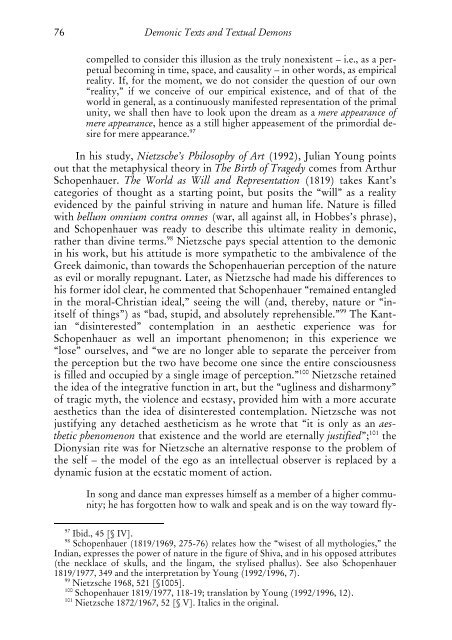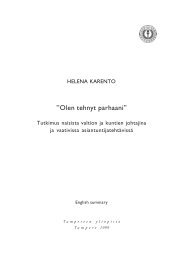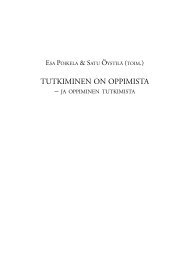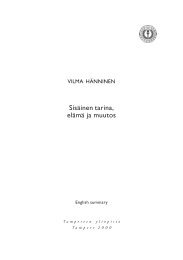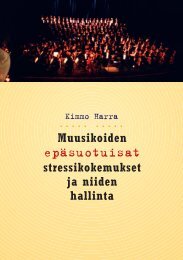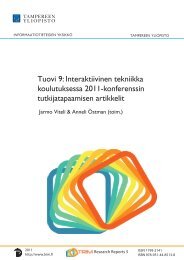Note on this edition: this is an electronic version of the 1999 book ...
Note on this edition: this is an electronic version of the 1999 book ...
Note on this edition: this is an electronic version of the 1999 book ...
Create successful ePaper yourself
Turn your PDF publications into a flip-book with our unique Google optimized e-Paper software.
76Dem<strong>on</strong>ic Texts <strong>an</strong>d Textual Dem<strong>on</strong>scompelled to c<strong>on</strong>sider <strong>th<strong>is</strong></strong> illusi<strong>on</strong> as <strong>the</strong> truly n<strong>on</strong>ex<strong>is</strong>tent – i.e., as a perpetualbecoming in time, space, <strong>an</strong>d causality – in o<strong>the</strong>r words, as empiricalreality. If, for <strong>the</strong> moment, we do not c<strong>on</strong>sider <strong>the</strong> questi<strong>on</strong> <strong>of</strong> our own“reality,” if we c<strong>on</strong>ceive <strong>of</strong> our empirical ex<strong>is</strong>tence, <strong>an</strong>d <strong>of</strong> that <strong>of</strong> <strong>the</strong>world in general, as a c<strong>on</strong>tinuously m<strong>an</strong>ifested representati<strong>on</strong> <strong>of</strong> <strong>the</strong> primalunity, we shall <strong>the</strong>n have to look up<strong>on</strong> <strong>the</strong> dream as a mere appear<strong>an</strong>ce <strong>of</strong>mere appear<strong>an</strong>ce, hence as a still higher appeasement <strong>of</strong> <strong>the</strong> primordial desirefor mere appear<strong>an</strong>ce. 97In h<strong>is</strong> study, Nietzsche’s Philosophy <strong>of</strong> Art (1992), Juli<strong>an</strong> Young pointsout that <strong>the</strong> metaphysical <strong>the</strong>ory in The Birth <strong>of</strong> Tragedy comes from ArthurSchopenhauer. The World as Will <strong>an</strong>d Representati<strong>on</strong> (1819) takes K<strong>an</strong>t’scategories <strong>of</strong> thought as a starting point, but posits <strong>the</strong> “will” as a realityevidenced by <strong>the</strong> painful striving in nature <strong>an</strong>d hum<strong>an</strong> life. Nature <strong>is</strong> filledwith bellum omnium c<strong>on</strong>tra omnes (war, all against all, in Hobbes’s phrase),<strong>an</strong>d Schopenhauer was ready to describe <strong>th<strong>is</strong></strong> ultimate reality in dem<strong>on</strong>ic,ra<strong>the</strong>r th<strong>an</strong> divine terms. 98 Nietzsche pays special attenti<strong>on</strong> to <strong>the</strong> dem<strong>on</strong>icin h<strong>is</strong> work, but h<strong>is</strong> attitude <strong>is</strong> more sympa<strong>the</strong>tic to <strong>the</strong> ambivalence <strong>of</strong> <strong>the</strong>Greek daim<strong>on</strong>ic, th<strong>an</strong> towards <strong>the</strong> Schopenhaueri<strong>an</strong> percepti<strong>on</strong> <strong>of</strong> <strong>the</strong> natureas evil or morally repugn<strong>an</strong>t. Later, as Nietzsche had made h<strong>is</strong> differences toh<strong>is</strong> former idol clear, he commented that Schopenhauer “remained ent<strong>an</strong>gledin <strong>the</strong> moral-Chr<strong>is</strong>ti<strong>an</strong> ideal,” seeing <strong>the</strong> will (<strong>an</strong>d, <strong>the</strong>reby, nature or “initself<strong>of</strong> things”) as “bad, stupid, <strong>an</strong>d absolutely reprehensible.” 99 The K<strong>an</strong>ti<strong>an</strong>“d<strong>is</strong>interested” c<strong>on</strong>templati<strong>on</strong> in <strong>an</strong> aes<strong>the</strong>tic experience was forSchopenhauer as well <strong>an</strong> import<strong>an</strong>t phenomen<strong>on</strong>; in <strong>th<strong>is</strong></strong> experience we“lose” ourselves, <strong>an</strong>d “we are no l<strong>on</strong>ger able to separate <strong>the</strong> perceiver from<strong>the</strong> percepti<strong>on</strong> but <strong>the</strong> two have become <strong>on</strong>e since <strong>the</strong> entire c<strong>on</strong>sciousness<strong>is</strong> filled <strong>an</strong>d occupied by a single image <strong>of</strong> percepti<strong>on</strong>.” 100 Nietzsche retained<strong>the</strong> idea <strong>of</strong> <strong>the</strong> integrative functi<strong>on</strong> in art, but <strong>the</strong> “ugliness <strong>an</strong>d d<strong>is</strong>harm<strong>on</strong>y”<strong>of</strong> tragic myth, <strong>the</strong> violence <strong>an</strong>d ecstasy, provided him with a more accurateaes<strong>the</strong>tics th<strong>an</strong> <strong>the</strong> idea <strong>of</strong> d<strong>is</strong>interested c<strong>on</strong>templati<strong>on</strong>. Nietzsche was notjustifying <strong>an</strong>y detached aes<strong>the</strong>tic<strong>is</strong>m as he wrote that “it <strong>is</strong> <strong>on</strong>ly as <strong>an</strong> aes<strong>the</strong>ticphenomen<strong>on</strong> that ex<strong>is</strong>tence <strong>an</strong>d <strong>the</strong> world are eternally justified”; 101 <strong>the</strong>Di<strong>on</strong>ysi<strong>an</strong> rite was for Nietzsche <strong>an</strong> alternative resp<strong>on</strong>se to <strong>the</strong> problem <strong>of</strong><strong>the</strong> self – <strong>the</strong> model <strong>of</strong> <strong>the</strong> ego as <strong>an</strong> intellectual observer <strong>is</strong> replaced by adynamic fusi<strong>on</strong> at <strong>the</strong> ecstatic moment <strong>of</strong> acti<strong>on</strong>.In s<strong>on</strong>g <strong>an</strong>d d<strong>an</strong>ce m<strong>an</strong> expresses himself as a member <strong>of</strong> a higher community;he has forgotten how to walk <strong>an</strong>d speak <strong>an</strong>d <strong>is</strong> <strong>on</strong> <strong>the</strong> way toward fly-97 Ibid., 45 [§ IV].98 Schopenhauer (1819/1969, 275-76) relates how <strong>the</strong> “w<strong>is</strong>est <strong>of</strong> all mythologies,” <strong>the</strong>Indi<strong>an</strong>, expresses <strong>the</strong> power <strong>of</strong> nature in <strong>the</strong> figure <strong>of</strong> Shiva, <strong>an</strong>d in h<strong>is</strong> opposed attributes(<strong>the</strong> necklace <strong>of</strong> skulls, <strong>an</strong>d <strong>the</strong> lingam, <strong>the</strong> styl<strong>is</strong>ed phallus). See also Schopenhauer1819/1977, 349 <strong>an</strong>d <strong>the</strong> interpretati<strong>on</strong> by Young (1992/1996, 7).99Nietzsche 1968, 521 [§1005].100 Schopenhauer 1819/1977, 118-19; tr<strong>an</strong>slati<strong>on</strong> by Young (1992/1996, 12).101Nietzsche 1872/1967, 52 [§ V]. Italics in <strong>the</strong> original.


